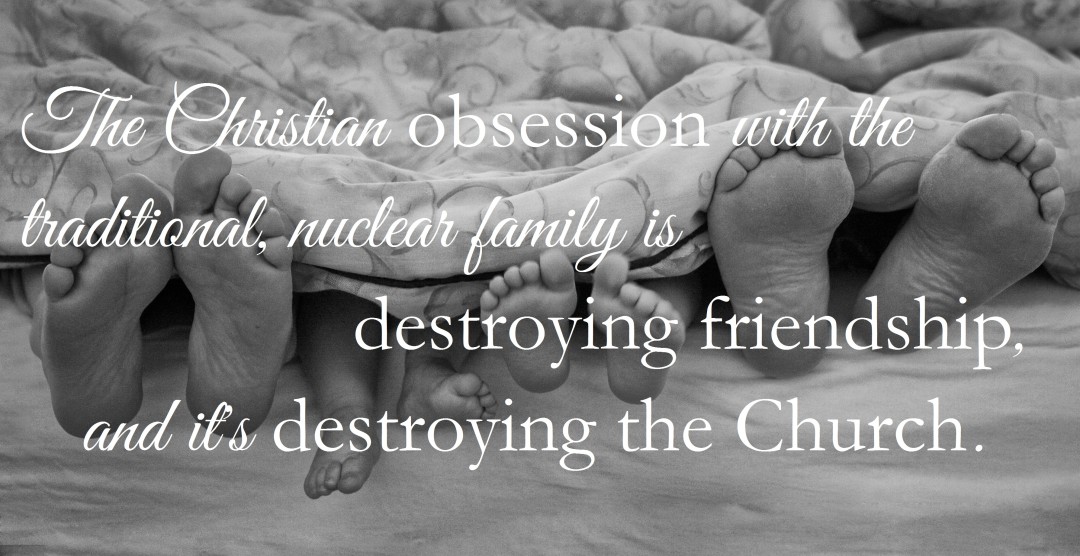I’ve been mulling over a few thoughts for the past few months, and they all sort of came to a head last night. Suddenly things that didn’t seem to be connected fit together to create one compelling conclusion: the Christian obsession with marriage and family (read: traditional, nuclear) is destroying the Church and her people.
A bit ago I was a part of a discussion group to help a group of pastors who wanted to make sure they created a safe space for LGBT+ people, regardless of whether or not they identified as Side A or Side B. One of the things that was emphasized over the course of the discussion was the absolute need for married-couples centrism to end. Most of the churches I’ve been in don’t know what to do with unmarried people, especially once those people reach 30.
Church is supposed to be a community, but many churches have adopted this mentality of segregating everything up by “life stage” and gender– see Ladies’ Bible Studies and Men’s Prayer Breakfasts and the endless barrage of things for married people to do. At the last church we attended, the church set up a “Dinners for 8” program so married couples of similar ages could get to know each other. They didn’t offer anything similar for single people.
Over time it began to deeply bother me that conservative evangelicals want to shove celibacy down every queer person’s throat, but offer nothing for them. No sense of community, of belonging. Nothing to help strengthen or comfort, or help them get by in a world where they’re forbidden from being with anyone they love. “If you’re gay, then you need to remain celibate,” is the message, but then they just boost them out into the cold dark night of loneliness with a swift kick to the rear.
Another thing that seemed unrelated at first is my beef with the phrase “emotional adultery.” All of us, but most especially married people, are cautioned from basically every side to avoid “close emotional connections with the opposite sex.” This completely ignores non-binary people, who have no “opposite sex,” and bisexual people, because the idea is that we should avoid friendships with the gender we’re attracted to, and bi people are attracted to all genders. It’s also heteronormative, but affects lesbian and gay individuals differently.
Aside from the fact that this “avoid emotional adultery!” teaching is tantamount to “have no friends!” for bi people, it also makes it seem anathema for straight people to have friendships with someone of the same gender– a position that seems completely unsupported in the Bible, what with everyone thinking of each other as brother and sister and having all things in common and hanging out together all the time and greeting each other with holy kisses.
And the last thing was a eureka! moment I had last night: I have never, not once, heard a message on the topic “this is how you can have a good friendship.” Oh, I’ve heard plenty about avoiding people who would “corrupt your good manners” and lots of messages on how “iron sharpeneth iron,” but nothing that covers things like friendships require healthy boundaries or friends should communicate about their needs.
Instead, what we get is lots and lots and LOTS of messages on being a good husband or wife, on the importance of marriage and family, and a fairly basic human need like friendship is completely shoved aside in favor of the Idol of the Nuclear Family. This obsession has wreaked violence and harm in the form of homophobia and anti-marriage-equality bigotry, but it’s also destroyed the Church because we’ve collectively decided that being a community of friends is less important than worshiping a false idol.
One of the things that has always made me wistful and left me longing are the descriptions of the early church in Acts. They cared about each other, helped each other, and it didn’t matter if your family was close by, or if you still had parents living, or if your husband was dead. They thought of each other as individuals, as friends, as community, not as a loosely organized structure of Family Units. You weren’t important to them only as long as you had 2.5 kids, a picket fence, and a dog– being a person created with the Imago Dei was more than enough.
I think the modern American church desperately needs to get back to that. We’ve been so obsessed with “One Man, One Woman” for so many years that it’s made us blind to our basic human needs. We can’t afford to ignore friendship. Without it, we the Church are as clanging brass. The sound of the fury, signifying nothing. If we can’t even offer friendship, what else is there?



